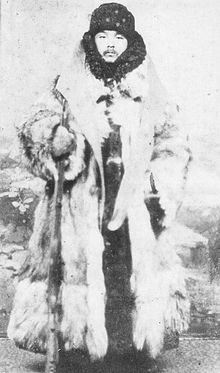Tamai Kisaku
Tamai Kisaku ( Japanese 玉井 喜 作 ; born June 30, 1866 in Hikari , Yamaguchi prefecture ; † September 25, 1906 in Berlin ) was a Japanese adventurer and journalist .
Life
Tamai Kisaku was already considered highly gifted as a pupil and student with an excellent knowledge of German and was appointed professor for German at the Sapporo Agricultural School (now Hokkaidō University ) at the age of 22 in 1888 .
In 1884 Tamai married the Japanese Harada Etsu ( 原田 エ ), with whom he had three children. In 1892, however, Tamai Kisaku left his wife and children alone in Japan to embark on an adventurous journey from Shimonoseki via Korea , Vladivostok , to Irkutsk and Tomsk through Siberia to Berlin . On the way, Tamai Kisaku worked six months in a Russian department store in Vladivostok and three months in Irkutsk. In Irkutsk, Tamai joined a tea caravan that he accompanied to Tomsk.
He described his arduous journey ( using the spelling of the name Kisak Tamai ) in his book Karawanenreise in Sibirien , which was first published in the Kölnische Zeitung in December 1898 as a travel report. This work, originally written in German and Russian, was only translated into Japanese in 1963 and published by Chikuma Shōbō.
In 1894 Tamai Kisaku finally arrived in Berlin, where he first worked in a tea shop and later studied law from 1895 to 1896 .
Tamai Kisaku began his journalistic career reporting on the Sino-Japanese War (1894–1895) , which broke out shortly after he started working. With the support of Alexander von Siebold , Tamai published the TOA magazine from 1898 . East asia. Monthly magazine for trade, industry, politics, science, art out. It was the first Japanese press medium to be written in German and the first Japanese magazine in Europe at all. The magazine was published until 1910 even after Tamai's death. In Japan, Tamai reported on Germany in the Ōsaka Asahi Shimbun ( 大 坂 朝日 新聞 ).
Tamai Kisaku died in Berlin in 1906. 300 people attended his funeral. In the meantime he had gained a reputation as the unofficial ambassador of Japan in the Japanese community .
Web links
- Tamai Kisaku 玉井 喜 作 (1866-1906) Japanese adventurer and journalist in Berlin at das-japanische-gedaechtnis.de
| personal data | |
|---|---|
| SURNAME | Tamai, Kisaku |
| ALTERNATIVE NAMES | 玉井 喜 作 (Japanese); Tamai Kisak |
| BRIEF DESCRIPTION | Japanese adventurer and journalist |
| DATE OF BIRTH | June 30, 1866 |
| PLACE OF BIRTH | Hikari |
| DATE OF DEATH | September 25, 1906 |
| Place of death | Berlin |
